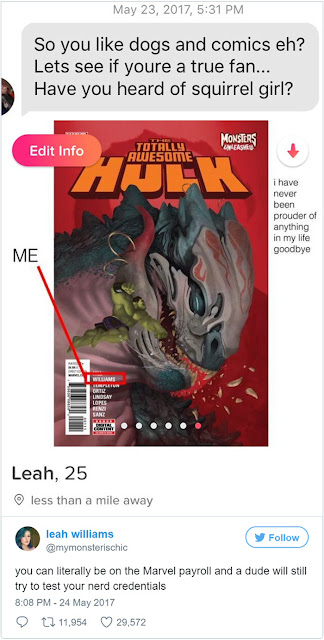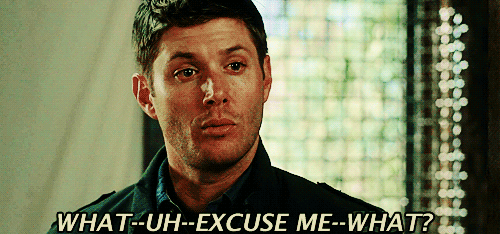But long before the catchphrase became our battle cry, 'geek girls' were ahead of the game.** Whether it's your typical comic book/video game geeks, or girls who are interested in typically male-dominated, 'nerdy' fields like the sciences and mathematics, we've been fighting that battle for generations.
It's incredible to see how far we have come in some areas, while disheartening to see how much worse things have gotten in others.
Growing up in the '90s and early 2000s, I heard all the time about how 'geeky' things weren't for girls. About how comic books were for boys, video games were for boys, and it was time for me to just grow up. I was told guys wouldn't like me because I wasn't interested in clothes, or being girly, or really anything feminine.
Though hearing these things is frustrating, it’s not the worst thing we’ve had to fight against. The attitude of many boys in the geek world is very disheartening. Although there are many who are incredibly welcoming and open to diversity, there are a large number who still treat it all as if it were a giant boys’ club.
There seems to have been this idea perpetuated over the years that anything nerdy or geeky was for guys only, as if they had the sole claim to enjoying these things. Even before the term ‘fake geek girl’ was coined by guys whose masculinity was apparently threatened by the mere thought of a girl sharing their interests, guys were demanding girls provide proof they actually liked the things they were claiming to like.
‘If you’re really a fan of Star Wars, what happened to Boba Fett after falling into the Sarlacc pit?’
‘If you’re really a fan of the X-Men, how did Scott Summers die? Who was Nightcrawler’s mother?’
‘You know XYZ was around long before the movies, right? Bet you’ve never seen any of the original stuff.’
Things became quite volatile for girl gamers as well when online gaming was really taking off. There, we had to learn to take a stand for ourselves amidst guys who couldn’t handle girls playing online. Even when we could hold our own, sometimes it still wasn’t enough. In the early days of online forums like 4chan and reddit, there was a thread where guys would post a girl’s gamertag to ‘blacklist’ her from online games, particularly Halo.
At one point, after I started climbing the ranks, I made the mistake of going on the mic. My teammates turned on me, guys got angry and started calling me insanely derogatory names, and I would get booted out of game after game. I hit the point where I couldn’t even log in to a match without being greeted by name-calling, guys making sexual comments, you name it.
In general, female geeks have to fight for every inch we get. We’re constantly being asked to prove our geek cred, as if having different genitalia from men automatically means we are incapable of fully grasping the things we are into.
A few years back, the ‘fake geek girl’ crusade began; the idea that a girl must fit certain criteria in order to qualify as a true geek grew rampant. Every single thing a girl didn’t know, hadn’t done, read, seen, or played, immediately became a reason to revoke her ‘geek card,’ despite how much else she might be interested in.
We were told how geek girls should actually look--because no girl who wears pink and makeup could ever like video games and Star Wars, right?
But through all of this, fangirls of all shapes, sizes, and interests alike have done something incredible--we’ve never let this form of patriarchy win or force us into accepting their terms. And why should we? One thing the world of sci-fi and fantasy has gotten right more often than the Hollywood scene is the creation of strong, independent, incredible female characters who bow down to no man.
We never caved to the males who said we couldn’t be these things because we had incredible role models to look up to from day one.
The only difference now is girls and women seem to be becoming more comfortable at stepping up and shouting our geekiness to the world. We’re learning to embrace ourselves publicly instead of hiding.
While many of these men who dislike us would like to think we hid because we were afraid of being proven to falsely carry the geek label, it was mostly because we didn’t want to have to deal with all the things that came with publicly being a geek girl. The constant questioning, the constant proving--all the things that would take us away from our time spent doing the things we loved.
So what’s changed? In my opinion, it boils down to the idea that we’ve literally got zero f***s to give now. We know who we are, and thanks to the explosive nature of the internet, we have ways to connect with other women like ourselves and share with them.
 |
| (source) |
No matter how much some men would like to believe otherwise, we women have played a pretty big role in geek culture for a very, very long time. Although female leads may not have gotten as big a spotlight as males, women have been heavily involved in the production, art, writing, and design of comic books, movies, and video games pretty much since the beginning. This whole culture they claim belongs to men was partially shaped by women to begin with.
We don't need approval to be who we are. We don't need their okay to cheer for strong, female leads taking the reins. And most importantly, we don't need to apologize for making sure we have more representation in our culture. We are awesome, and we're not going anywhere.
** Being "ahead of the game," in this piece, is in reference solely to the idea of smashing the patriarchy and not to feminism in general.
What makes you proud to claim your title as a nerd, geek, fangirl, or all of the above?








I LOVE THIS SO MUCH YOU DON'T EVEN KNOW HOW MUCH I NEEDED THIS POST IN MY LIFE!!! So I grew up believing a lot of these stereotypes to some extent because they were pushed on my so much, and I thought I had to be more 'masculine' to fit into the geek club and I never got into certain fandoms or gaming because they were never presented as an option to me. Now I'm 18 and I feel dumb asking people to teach me about video games or share their nerd knowledge because I'm so late to the game (literally XD). Corny jokes aside, being a geek girl has really positively changed my life (looking at you Tolkien) and it's so awesome though to know that THIS is a community where I won't be labeled a 'fake' geek or nerd and where I can ask questions and learn more without judgement. So thank you gals so much!!! <3 <3 <3
ReplyDeleteNamárië,
Lizzy
Thanks for the comment and for sharing Elizabeth!! I'm really glad to hear this post was timely for you. Over the years, I've met many other women who never really grew up involved in these aspects but wanted to and weren't sure how to get involved. It's where this idea of the fake geek girl came from, and it was super frustrating to see.
DeleteRegardless of whether you're just into a few things, just getting into things, or an all out geek, you still get to call yourself one and partake in this awesome world. <3